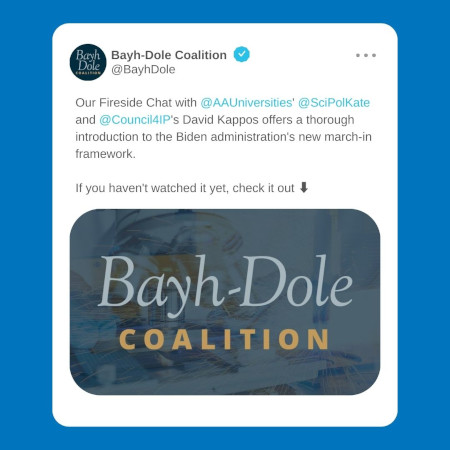 AAU Says Respecting the First Amendment on Campus Act Would Actually Hurt Campus Speech
AAU Says Respecting the First Amendment on Campus Act Would Actually Hurt Campus Speech
The House Committee on Education and the Workforce advanced a bill out of committee last week that AAU believes would have a detrimental effect on colleges and universities’ ability to fulfill their missions, serve and protect students, and uphold free speech on campus.
The committee voted 24-14 along party lines to advance the Respecting the First Amendment on Campus Act (H.R. 7683), which was introduced on Friday, March 15, by House Education Committee Chair Virginia Foxx (R-NC) and Rep. Brandon Williams (R-NY). According to a fact sheet released by the committee, the bill, among other things, “makes free speech on campus a condition of receiving Title IV funds under the Higher Education Act,” “ensures students are educated on their First Amendment rights,” and “requires all institutions to disclose annually First Amendment policies held by the institution.”
AAU released a statement last week opposing the Respecting the First Amendment on Campus Act. “The bill not only threatens universities’ autonomy and flexibility to fulfill their missions and serve students; it will actually have a negative – as opposed to the intended positive – impact on ensuring free speech on college campuses and campus safety,” the statement noted. It pointed out that stakeholders received very little time “to provide meaningful input to committee members on the bill and its consequences.”
AAU also joined a letter led by the American Council on Education opposing the bill. “H.R. 7683 would inject the federal government in higher education in a new and counterproductive fashion by imposing a rigid, highly prescriptive, and costly regulatory and enforcement framework on nearly 2,000 public colleges and universities,” the letter said.
 Coalitions Request Increased Funding for Scientific Research in FY25
Coalitions Request Increased Funding for Scientific Research in FY25
As the FY25 budget process gets underway, higher education and science coalitions are asking lawmakers to grow the government-university partnership and to increase funding levels for key federal scientific research agencies:
- The Coalition for National Science Funding, which includes AAU, sent letters earlier this month to key congressional appropriations committee members requesting at least $11.9 billion in funding for the National Science Foundation in FY25.
The letters reminded appropriators that Congress created a target of $16.7 billion in funding for the agency in FY25 through the CHIPS and Science Act of 2022, and that the FY24 funding level fell far below what our nation needs to remain competitive. “NSF needs major growth in FY25 appropriations,” the letters emphasized.
- The Energy Sciences Coalition, of which AAU is a member, sent a letter urging Congress to appropriate $9.5 billion in FY25 for the Department of Energy Office of Science.
The letter noted that the increase in appropriations “is needed to accelerate construction of world-class scientific facilities, support groundbreaking scientific discoveries, advance energy technologies needed for the nation to meet net-zero carbon emissions, develop emerging technologies, and grow a highly skilled and diverse science and technology workforce that is essential for the United States to compete globally.”
 FEATURED RESOURCE: Fund American Science
FEATURED RESOURCE: Fund American Science
 New Report Says U.S. Universities Must Prioritize Attracting International Students
New Report Says U.S. Universities Must Prioritize Attracting International Students
A new brief from the Institute of International Education argues that the United States has more capacity to host international students than our competitor nations and should invest in strategies that make international student enrollment a priority.
The brief noted that top destinations for international students (such as Canada, Australia, and the United Kingdom) are increasingly “running out of capacity to host international students.” It found that, in these countries, “the capacity to host international students has reached 22-30 percent and has triggered discussion of limits to additional growth.” In the United States, however, international students “comprised just 6 percent of all U.S. higher education enrollment” and universities “have the capacity and desire to host more international students.” In fact, in a survey last year, 92% of U.S. institutions expressed interest in increasing their international enrollment in the next five years.
The brief argued that, in order to take advantage and attract more students, colleges and universities of all types across the United States “should focus their institutional strategy at the highest levels on internationalization.” It continued: “Increasing enrollment of international students is an ingredient for success that, if a priority, will promote the well-being of institutions of all types.” The report recommended that institutions increase housing and support services for international students; expand student recruitment from countries beyond China and India; improve financial support for international students; and advocate for increasing student visa issuance.
AAU, Associations Ask Education Department to Delay Reporting Requirements on Financial Value Transparency and Gainful Employment
Earlier this month, AAU joined the American Council on Education and 20 other higher education associations on a letter asking the Department of Education to delay all reporting requirements related to financial value transparency and gainful employment (FVT and GE) contained in a final rule released last year.
The gainful employment provisions of the rule require private for-profit institutions and certificate programs at all colleges to use a “debt-to-earnings” ratio to demonstrate that all of their graduates earn enough to afford their student loan repayments. The transparency portion of the rule creates a framework to provide students with information about “typical earnings outcomes, borrowing amounts, cost of attendance, and sources of financial aid.” The rule requires colleges and universities to report data on these provisions starting July 31; the department expects to launch a public website containing that data in 2026.
The associations’ letter noted that institutions are navigating FAFSA delays while still awaiting clarification from the department on how to implement the rule. “The primary focus at this time should be ensuring the smoothest FAFSA process possible to help students best decide where to pursue their postsecondary education,” it said.
A group of bipartisan senators made a similar point in a letter they sent to the Department of Education asking it to delay FVT and GE reporting deadlines. “Giving institutions more time to complete this reporting will have no negative impact on students and families in terms of institutional accountability or transparency, but will certainly benefit them by having financial aid administrators focused in these upcoming months on getting their financial aid in order,” it said.
 AAU Endorses Building Civic Bridges Act
AAU Endorses Building Civic Bridges Act
Earlier this month, Reps. Derek Kilmer (D-WA) and Andy Barr (R-KY) introduced the Building Civic Bridges Act. The bill would create an Office of Civic Bridgebuilding within AmeriCorps that would, among other things, provide competitive grants to nonprofits, universities, religious organizations, and other groups to initiate civic bridgebuilding programs that would facilitate conversations within a community across ideological spectrums. The bill would also fund research on civic bridgebuilding.
AAU endorsed the bill when it was first introduced in 2022 and is doing so again. AAU President Barbara R. Snyder told Rep. Kilmer’s office: “America’s leading research universities play a key role in fostering civil discourse, and our members work every day with local, state, and federal partners to encourage civic bridgebuilding. AAU is proud to support the Building Civic Bridges Act as a simple, smart, evidence-based way of fighting polarization and encouraging meaningful dialogue.”
 ICYMI: Barbara’s Blog: Responding Constructively to Corrosive Division
ICYMI: Barbara’s Blog: Responding Constructively to Corrosive Division
 NSF Releases New Report From Advisory Group on Ensuring Scientific Openness While Safeguarding Sensitive Research
NSF Releases New Report From Advisory Group on Ensuring Scientific Openness While Safeguarding Sensitive Research
The JASON advisory group, which is composed of highly respected scientists who advise the federal government on scientific and technological matters with national security implications, has released a new report on how the National Science Foundation “might respond to growing concerns that the openness of the U.S. academic research system was being taken advantage of by other countries.”
The report identified four major themes – the value of foreign talent; the harms caused by “new restrictions on access to the results of fundamental research;” the need to expand “our notion of research integrity to include disclosures of commitments and potential conflicts of interest;” and the need for a shared understanding between academia and federal agencies about how to best promote research security while maintaining scientific openness.
In a press statement, the NSF said that it is analyzing the report’s findings and “will consider the implementation of the recommendations as it continues to develop and implement new policy review processes for national security concerns.”
News of Interest
Tampa Bay Times: USF Announces Plan to Create Florida’s First AI, Cybersecurity College – The University of South Florida announced that it will open Florida’s first college focused on artificial intelligence and cybersecurity. The college will offer both graduate and undergraduate programs. USF President Rhea Law said: “Through the expertise of our faculty and our strong partnerships with the business community, the University of South Florida is strategically positioned to be a global leader in these fields.”
Inside Higher Ed: No Surprises for Higher Ed in Spending Bill – The latest funding package released by lawmakers includes flat funding for federal student aid ($24.6 billion) and the Pell Grant, which will remain at $7,395. The package also includes $46.7 billion for the National Institutes of Health, “$378 million less than the budget enacted last January.”
Forbes: Don’t Make Innovation a Casualty of the War on Universities – In an opinion essay, Vanderbilt University Chancellor Daniel Diermeier cautioned that we mustn’t overlook the immense social and economic benefits of university research and innovation during the current wave of scrutiny and criticism of higher education. “Higher education has real problems that need fixing,” Diermeier wrote, adding: “But amid the strident criticism of universities, we must not lose sight of the fact that university innovations regularly make life better in profound ways and fuel the American economy.”
Science: Analysis: How NSF’s Budget Got Hammered – The CHIPS and Science Act of 2022 promised to double the National Science Foundation’s budget to $18.9 billion by 2027. Instead, Congress cut the agency’s budget by 8% this year. This shortfall in the agency’s budget, said AAU President Barbara R. Snyder, “is gambling our nation’s future.”
Times Higher Education: US Research Funding Increasingly Reliant on Corporate Agendas – A new report found that the private sector now funds 36% of basic research in the United States, while the federal government funds 40%. This poses a problem for the U.S. scientific research enterprise because companies have “only a limited scope of scientific interest.” In positive news, the report also found international graduate enrollment in science and engineering in the United States is increasing. However, the decline in the number of students from China shows that the United States needs to cultivate other foreign and domestic talent, said AAU Senior Vice President for Government Relations and Public Policy Toby Smith.
Featured Research

Americans Struggle to Distinguish Factual Claims from Opinions Amid Partisan Bias
New research at the University of Illinois Urbana-Champaign finds that “Americans struggle to tell the difference between statements of fact and statements of opinion” and that a strong reason for this is partisan bias. The research demonstrates that fact-checking may not provide an effective counter to misinformation and that partisan polarization may limit “the possibility of meaningful communication.”

AI-Driven Earthquake Forecasting Shows Promise in Trials
Researchers at the University of Texas at Austin have developed an artificial intelligence algorithm that “correctly predicted 70% of earthquakes a week before they happened during a seven-month trial in China.” The trial “is a milestone in research for AI-driven earthquake forecasting,” which could, one day, “limit earthquakes’ impact on lives and economies.”
From Our Feeds

The Bayh-Dole Coalition hosted a “fireside chat” last December to discuss the short- and long-term impacts of the Biden administration’s proposed framework for how federal agencies use the “march-in” rights granted to them under the 1980 Bayh-Dole Act.
The framework, which AAU opposes, would threaten the American innovation system and discourage partnerships between nonprofit research universities and the private sector that help bring cutting-edge technologies to the public. The “fireside chat” featured AAU Associate Vice President and Counsel for Government Relations and Public Policy Kate Hudson, Bayh-Dole Coalition Executive Director Joseph P. Allen, and Council for Innovation Promotion Co-Chair David Kappos.